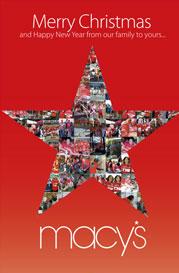
The secularization of Christmas and the War on Christmas refer to the notion that the Christmas holiday is under attack from a general secular trend or from persons and/or organizations with a deliberate or unconscious anti-Christian agenda.
While different versions of this argument have existed for two centuries, there are significant differences between them. Historically, traditional Christians have objected to including secular or pagan symbols into Christmas celebrations. The current debate in the United States revolves around a claim that Christmas is being censored. A symbolic issue is the replacement of the greeting "Merry Christmas" with generic equivalents such as "Happy Holidays". As an example, Don Feder, president of Jews Against Anti-Christian Defamation, complains about a "politically correct purging of Christmas from our culture." [1]
The term "War on Christmas" was first coined by Peter Brimelow in the December 12, 1999 column at VDARE.com. It is now widely used, even by commentators who deny that any such thing exists.
Contents |
Incorporating secular or pagan elements into Christmas
Protestantism
Prior to the Victorian era, Christmas was primarily a religious holiday, and its importance was often considered secondary to Epiphany and Easter. As was the case with other Christian holidays, it borrowed elements from pagan culture, including the Advent period, gift giving, yule logs, Christmas trees, decorations such as candles, holly, and mistletoe. During the various Protestant reformations, these (really or supposedly) paganizing elements were a source of controversy. Some sects, such as the Puritans, rejected Christmas as an entirely pagan holiday. Others rejected certain aspects of Christmas as paganizing, but wanted to retain the "essence" of the holiday as a celebration of the Christ's birth. This tension put in motion an ongoing debate about the proper observance of Christmas.[1]
19th century
According to historian Ronald Hutton, the current state of observance of Christmas is largely the result of a mid-Victorian revival of the holiday spearheaded by Charles Dickens, who in A Christmas Carol sought to construct Christmas as a family-centered festival of generosity, in contrast to the prior, community and church centered observations whose observance slowly dwindled in the late eighteenth and early nineteenth centuries. The holiday, remade as a family centered rather than community centered festival, carried its own set of contradictions: the practice of gift-giving raised the possibility of commercial cooptation, and the familial rather than community focus of the holiday was not particularly conducive to communal religious observance.[2]
Early 20th century
In the early twentieth century, Christian writers such as C. S. Lewis had already noted a distinct split between the religious and secular observance of Christmas. In Xmas and Christmas: A Lost Chapter from Herodotus, Lewis gives a satire of the observance of two simultaneous holidays in "Niatirb" (Britain backwards) from the supposed view of the Greek historian and traveller. One, "Exmas", is observed by a flurry of compulsory commercial activity and expensive indulgence in alcoholic beverages. The other, "Crissmas," is observed in Niatirb's temples. Lewis's narrator asks a priest "why they kept Crissmas on the same day as Exmas?" He receives the reply:
- "It is not lawful, O Stranger, for us to change the date of Crissmas, but would that Zeus would put it into the minds of the Niatirbians to keep Exmas at some other time or not to keep it at all. For Exmas and the Rush distract the minds even of the few from sacred things. And we indeed are glad that men should make merry at Crissmas; but in Exmas there is no merriment left." And when I asked him why they endured the Rush, he replied, "It is, O Stranger, a racket. . . "[3]
The December 1957 News and Views published by the Church League of America, an organization co-founded in 1937 by George Washington Robnett attacked the use of Xmas in an article titled "X=The Unknown Quantity." The claims were picked up later by Gerald L.K. Smith who in December 1966 claimed that Xmas was a "blasphemous omission of the name of Christ" and that "'X' is referred to as being symbolical of the unknown quantity." Smith further argued that Jews introduced Santa Claus to suppress the New Testament accounts of Jesus, and that the United Nations at the behest of "world Jewry" had "outlawed the name of Christ." Such claims are made in the face of documented centuries-long history of use of Χ (actually a chi) as an abbreviation for "Christ" (Χριστός).
Christmas observances (at least the overtly religious kinds) were banned in the Soviet Union and under certain other Communist regimes, and played down in all of them. Certain Christian sects, such as the Jehovah's Witnesses and some fundamentalist churches, continued to reject the holiday as well, citing its pagan and/or Roman Catholic origins.
Claims of Christmas censorship
Contemporary United States

In the year 2000 and subsequently, the analysis of a "War on Christmas" became a prominent piece of conservative cultural criticism.
The phrase "Season's Greetings," as opposed to "Merry Christmas," has become a particular concern to many people. The phrase "Season's Greetings" is used on many postcards (as, for example, those sent out by the American Library Association), and by door clerks at Wal-Mart and other major stores. Don Feder, president of Jews Against Anti-Christian Defamation stresses that it should be okay to say "Merry Christmas", and complained about "politically correct purging of Christmas from our culture." [4] Rabbi Daniel Lapin believes that "saying Merry Christmas is NOT Offensive" and complains that "We see obsequious regard for faiths like Judaism and even Islam, while Christianity is treated with contempt". [5] Further, Lapin says that "Nationwide, Christmas Nativity scenes are banned from city halls and shopping malls but Chanukah menorahs are permitted. (They are only cultural symbols, not religious, you see.)" and concludes that "Religious Freedom is for Everyone - Not Just Minorities" [6].
The idea of a war on Christmas in America gained prominence following extensive coverage on the Fox News Channel. The channel's commentators Bill O'Reilly and Sean Hannity first spoke of a "war on Christmas" in the months leading up to the 2004 holiday season, and picked up the topic again in late 2005. In particular, they cited certain school decisions and municipal codes that were supposed to single out Christmas observances for special restriction.
In several cases, the news items mentioned on Fox were denied by the persons involved. For example, O'Reilly said that the township of Saginaw, Michigan, "opposes red and green clothing on anyone." The town supervisor responded that "O'Reilly's comments are flat-out not true...the township hall has red and green Christmas lights adorning the building at night." Nevertheless, these reports bolstered a widespread popular sentiment that Christmas was being attacked by the political left. This was, and is, widely discussed on the Internet, especially in the blogosphere. A Fox News / Opinion Dynamics poll for November 29–30, 2005 found that 42% of respondents believe that "there is a War on Christmas in the US today," with 48% in disagreement. Media Matters for America, a watchdog group critical of conservative media, reported that from Monday, November 28, to Friday, December 2, Fox News aired 58 different reports, interviews, and debates about the War on Christmas. [8] Many print and television media outlets are skeptical, calling it a conspiracy theory or a deliberate attempt to further a conservative Christian agenda. [1] [31]


Regarding the phrase "Season's Greetings," as opposed to "Merry Christmas," O'Reilly argued: "Every company in America should be on their knees thanking Jesus for being born. Without Christmas, most American businesses would be far less profitable," O'Reilly said on a Fox News program. "More than enough reason for business to be screaming 'Merry Christmas'." Critics, however, point out that attempting to include non-Christians in Christmas by generalizing the holiday is a wholly capitalistic method of increasing profits — the more people affected by marketing, the more people will come out and purchase. [7]
While the controversy over the phrase "Season's Greetings" strongly echoes Robnett's concern about the phrase "Xmas," the "War on Christmas" idea, however, differs from earlier discussions of the secularization of Christmas in two important regards. First, it treats many of the (really or supposedly) paganizing elements of Christmas observance as if they were essentially Christian symbols, so that, for example, Saginaw's purported ban of red and green clothing is an anti-Christian act. This is in contrast to many earlier critics of Christmas, such as the Puritans or the Jehovah's Witnesses: by them, the removal of Christmas trees, yule logs, and so forth would be viewed as pro-Christian.
Second, earlier critics have usually seen Christian observance as coming under attack from generalized secular and capitalist trends. Modern critics tend to see Christmas as being specifically attacked by a conspiracy of secular forces, and are less concerned about the commericialization of Christmas per se. For example, John Gibson, wrote a book entitled The War on Christmas: How the Liberal Plot to Ban the Sacred Christian Holiday Is Worse Than You Thought (ISBN 1-59523-016-5), which was published in October of 2005. Gibson and others claim the abolition of Christmas (War on Christmas) is part of a broader "culture war" waged by progressives. O'Reilly claimed that "it's all part of the secular progressive agenda ... to get Christianity and spirituality and Judaism out of the public square." He also went on to say that this larger agenda includes "legalization of narcotics, euthanasia, abortion at will, gay marriage." [3] In this alleged recent movement, Gibson has charged that a wide array of groups, including "liberals," "secular progressives," the ACLU, the Anti-Defamation League, and Americans United for Separation of Church and State are the forces behind the attack, while O'Reilly has focused more narrowly on the ACLU and billionaire financier George Soros. [4] [5]
![By 10 December 2005, 15000 "Just Say 'Merry Christmas' " bracelets had been sold [2]](./modules/Christmas-MM/images/180px-Jsmc-bracelet.jpg)
See also
- Christmas
- Christmastime greetings
- See Santa Claus for entry on the Christian opposition to Santa Claus
- Secularization of other Christian holidays
External links
- How the secular humanist grinch didn't steal Christmas from Salon.com
- Concerned Women for America: Naughty and Nice list
- H. Res. 579
- Wal-Mart Sacramento "pro-Christmas" protest
- Media Matters for America dossier on War on Christmas
- Staff Opinion: Merry Christmas, even to Scrooges by Michael J. Thompson in The Auburn Plainsman
- The War on Christmas, the Prequel. When the holiday was banned from Slate
- The Deadweight Loss of Christmas: Comment by Bradley J. Ruffle and Orit Tykocinsky
- The abolition of Christmas by Pat Buchanan at WorldNetDaily
Organizations
- American Family Association, led a boycott of Target
stores in December 2005.
American Civil Liberties Union
Americans United for Separation of Church and State
Center for Reclaiming America, led by D. James Kennedy and Gary Cass.
Catholic League for Religious and Civil Rights
Committee to Save Merry Christmas, led by Maneul Zamorano
Friend or Foe Christmas Campaign, hosted by Liberty Counsel
References
- ^ Nissenbaum, Stephen. (1997). The Battle for Christmas. New York: Vintage Books. ISBN 0-67-974038-4.
- ^ Hutton, Ronald. (2001). Stations of the Sun: The Ritual Year in England. Oxford: Oxford Press. ISBN 0-19-285448-8.
- ^ Exmas and Christmas: A Lost Chapter from Herodotus by C. S. Lewis
Notes
- ↑ "Subject guide to Conservative and Libertarian materials, in Manuscript collections" University of Oregon
- ↑ Kominsky, Morris (1970). The Hoaxers: Plain Liars, Fancy Liars and Damned Liars, pages 137-138 ISBN 0-8283-1288-5
- ↑ Goldberg, Michelle. "How the secular humanist grinch didn't steal Christmas." Salon.com. Accessed 26 December 2005.
- ↑ Davis, Matthew. "Lines drawn in battle over Christmas." BBC News. Accessed 26 December 2005.
- ↑ "O'Reilly: 'War' on Christmas part of 'secular progressive agenda' that includes 'legalization of narcotics, euthanasia, abortion at will, gay marriage'." Media Matters. 21 November 2005. Accessed 26 December 2005.
- ↑ "O'Reilly: 'There's a very secret plan ... to diminish Christian philosophy in the U.S.A.'" Media Matters. 30 November 2005. Accessed 26 December 2005.
- ↑ "O'Reilly: Soros is 'Moneyman' Behind War on Christmas." Daily Kos. 2 December 2005. Accessed 26 December 2005.
- ↑ O'Reilly, Bill. "Take your Christmas and stuff it." Jewish World Review. 13 December 2004. Accessed 26 December 2005.
- ↑ Saunders, Greg. "Christmas Slime Is Here Again." This Modern World. 7 December 2005. Accessed 26 December 2005.
- ↑ "Battlefront Fox: Cable network aggressively promoted idea of Christmas 'war'." Media Matters. 7 December 2005. Accessed 26 December 2005.
- ↑ "Newspapers, commentators agree: Virginia, there is no War on Christmas." Media Matters. 23 December 2005. Accessed 26 December 2005.
- ↑ McAdam, Harry and Tim Spanton. "Battle to save CRIMBO." Accessed 26 December 2005.
- ↑ "Happy Holidays From the Republican National Committee." Accessed 26 December 2005.
- ↑ "Target Ad: Gather Round." Target.com. Accessed 26 December 2005
- ↑ "Boycott of Target over next Christmas." World Net Daily. 2 December 2005. Accessed 26 December 2005.
- ↑ "Bill O'Reilly doubleplusungood." onegoodmove. 4 December 2005. Accessed 26 December 2005.
- ↑ "Have President Bush, First Lady And Republican National Committee Joined 'War On Christmas'?" Americans United for Separation of Church and State. 30 November 2005. Accessed 26 December 2005.
- ↑ Cooperman, Alan. "'Holiday' Cards Ring Hollow for Some on Bushes' List." Washington Post. 7 December 2005. Accessed 26 December 2005.
- ↑ "O'Reilly falsely claimed a Texas school district banned red and green clothing, called move 'fascism'." MediaMatters.org. Accessed 25 December 2005.
- ↑ Breen, Kim. "O'Reilly: I made mistake". The Dallas Morning News. 21 December 2005. Accessed 25 December 2005.
- ↑ "'Red & Green Clothing Ban' False Rumor". PISD.edu. 12 December 2005. Accessed 25 December 2005.
- ↑ "O'Reilly's claim about Michigan town's opposition to Christmas colors is 'flat-out not true'." Media Matters. 13 December 2005. Accessed 26 December 2005.
- ↑ "Saginaw Township On The O'Reilly Factor Radio Program." WNEM TV5. Accessed 26 December 2005.
- ↑ "O'Reilly falsely claimed that 'spiritual' Christmas stamps are no longer being offered." Media Matters. 13 December 2005. Accessed 26 December 2005.
- ↑ "War on Christmas Fraud Exposed: The Silent Night 'Rewrite' That Wasn’t." Think Progress. 14 December 2005. Accessed 26 December 2005.
- ↑ Lewin, Adrienne Mand. "Critics Aren't Keeping Quiet Over 'Silent Night' Lyrics Change." ABCnews.com. Accessed 26 December 2005.
- ↑ Cline, Austin. "Christian Conspiracy Theories and the War on Christmas." About.com. 28 November 2005. Accessed 26 December 2005.
- ↑ "Keep Christ in Christmas." Knights of Columbus. 7 December 2005. Accessed 26 December 2005.
- ↑ "O'Reilly retreats in 'war on Christmas,' declaring: 'Happy Holidays is fine' Media Matters. 20 December 2005. Accessed 28 December 2005.
- ↑ [7]
- ↑ Young, Cathy. "What "Happy Holidays"?: Raging Christmas nitwits will be back next year." Reason Online. 28 December 2004.
- ↑ Media Matters report on Bill O'Reilly
- ↑ The Dodgeville School District sues the Liberty Counsel.
- ↑ "Newspapers, commentators agree: Virginia, there is no War on Christmas Media Matters. 23 December 2005.
- ↑ Wheaton, Wil. "The real war on Christmas." Salon.com. 22 December 2005.
- ↑ Rockwell, Lew. "Celebrate Christmas, or else!" The Huffington Post. 12 December 2005.




 216.73.216.133
216.73.216.133 User Stats:
User Stats:
 Today: 0
Today: 0 Yesterday: 0
Yesterday: 0 This Month: 0
This Month: 0 This Year: 0
This Year: 0 Total Users: 117
Total Users: 117 New Members:
New Members:
 216.73.xxx.xxx
216.73.xxx.xxx
 Server Time:
Server Time: